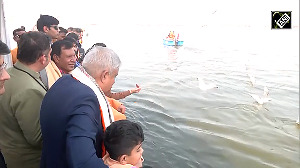Less than a year after their controversial engagement in Sharm-el-Sheikh, Prime Minister Manmohan Singh and his Pakistani counterpart Yousuf Raza Gilani will meet in Thimphu on with little expectations of any breakthrough. The two leaders shook hands twice during the opening day of the SAARC Summit today and Singh is expected to convey India's strong demand for action by Pakistan against the perpetrators of the Mumbai attack to Gilani.
Ending days of speculation, both the sides made the announcement about tomorrow's meeting. "It has been agreed through diplomatic channels that Prime Ministers of India and Pakistan will hold a bilateral meeting tomorrow at Thimphu," External Affairs Ministry spokesman Vishnu Prakash told reporters. An identically-worded statement was issued by Pakistani Foreign Office.
The day saw Singh and Gilani shaking hands twice, the first at the SAARC Village and the second when the Pakistan Prime Minister walked up to the Indian leader during the banquet hosted by Bhutan for the visiting leaders. A Pakistan PMO statement said that the two leaders met during the informal lunch hosted by Bhutanese Prime Minister Jigmi Thinley where Singh told Gilani that he was looked upon with respect as he has a number of spiritual followers in India.
"His (Gilani's) forefathers, the Indian Prime Minister said, had laid the foundation of Golden Temple in Amritsar and the Sikhs population is aware of this fact," the statement said. Later, on the insistence of other leaders, both the Prime Ministers walked together in the SAARC village and exchanged views. They strolled for sometime before returning to thier respective villas, it added.
All eyes are on the meeting, the first bilateral engagement between the two Prime Minister since they met in Sharm-el Sheikh on July 16,2 009. The Joint Statement issued after the meeting had triggered a major controversy in India over reference to "threats" in Balochistan, where Pakistan has been alleging Indian hand in terror incidents. The statement also appeared to delink the composite dialogue process from action on terrorism by Pakistan. India had suspended the composite dialogue process after the Mumbai attacks.
Asked about the meeting, External Affairs Minister S M Krishna said it was a "good step forward" and added that there were a host of issues that could come up for discussion. Pakistan Foreign Office spokesman Abdul Basit said the meeting would take place on Wednesday afternoon. Basit said there was no agenda for the meeting and it was important that it results in an agreement for resumption of the dialogue process.
Singh and Gilani had met for substantive discussions in Sharm-el-Sheikh in July last year when the two sides issued a controversial joint statement that talked delinking of terror from dialogue and had a mention of Baluchistan where They had two brief encounters earlier this month in Washington where both the Prime Ministers were to attend the Nuclear Security Summit.
On both occasions there were handshakes and pleasantaries exchanged. During tomorrow's meeting, Singh is expected to focus on India's "core" concern of cross-border terrorism and highlight its unhappiness over Pakistan having not done enough on this front. Singh is expected to seek an update on the investigations and trial in the Mumbai attacks case in Pakistan, government sources said. He is likely to point out that the threat of terrorism emanating from Pakistan continues to loom and Pakistan had not taken any concrete steps to eradicate this to create conditions for resumption of substantive dialogue.
Pakistan has arrested seven of those accused in the Mumbai terror strikes but India maintains it is not enough as the mastermind of the attacks -- Jamaat-ud-Dawa chief Hafiz Saeed -- was still moving about freely and engaging publicly in vitriolic tirade against India. Singh had underlined a few days back that several of the "conspirators", including Hafiz Saeed, were still roaming about freely and rejected Pakistan's contention that there was not enough evidence to act against him.
Pakistan had earlier this week stated that the dossiers handed over by India during the Foreign Secretary level talks in New Delhi on February 25 did not contain any evidence to book Saeed. The Pakistani side is also expected to raise the issue of water-sharing. Pakistan has been alleging that India was violating the Indus Water Treaty of 1960 by building a power project on Kishanganga river in Jammu and Kashmir, a contention rejected by India. India has put the composite dialogue on hold since the Mumbai attacks and refused to resume it till Pakistan punishes all those behind the carnage.







 © 2025
© 2025